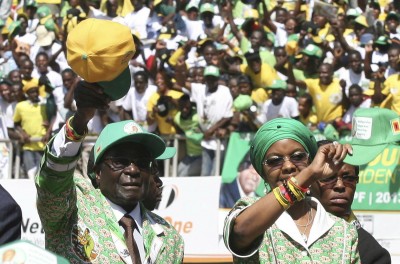Zimbabwe: Robert Mugabe Reelected – ZANU-PF Calls for Trillions in Mining and Foreign Assets to Be Turned Over to Zimbabweans

Although official vote totals in the July 31 election are still coming in, the people of Zimbabwe voted overwhelmingly to reelect President Robert Mugabe to another five-year term. Mugabe’s party, the Zimbabwe African National Union – Patriotic Front (ZANU-PF), also won the parliamentary election in a landslide, making gains and solidifying their majority. Despite claims by Mugabe’s opponent, Morgan Tsvangirai of the Movement for Democratic Change (MDC), that the elections were rigged, monitors from the African Union called the elections “peaceful, orderly, free and fair.”
Mugabe’s victory is a mandate for the ZANU-PF manifesto, which calls for over $1.8 trillion in idle mining assets and $7.3 billion in foreign-owned assets to be turned over to Zimbabweans. Voters similarly favor the ZANU-PF plan for “education for all,” “housing for all,” and gender equality “through laws, empowerment programs and promotion of women in sectors and positions previously held by men only,” according to the ZANU-PF 2013 election manifesto.
This is the third and latest defeat of MDC candidate Tsvangirai, who ran against Mugabe for President in 2002 and 2008. Although Tsvangirai led the 2008 presidential election, he failed to garner a majority vote and lost decisively in the runoff to Mugabe. Wikileaks cables from 2010 revealed collaboration between Tsvangirai with his MDC party and the U.S. Tsvangirai called on the Western countries to toughen the economic sanctions on his own country and people after he lost the election. Since that time, more and more Zimbabweans disapprove of the MDC in opinion polls.
In February 2013, Zimbabweans approved a new constitution, ending a power-sharing deal between ZANU-PF and the MDC. A decisive election victory for ZANU-PF provides a mandate and curbs outsider meddling in the internal affairs of Zimbabwe.
Indigenization Program central to election
Zimbabwe’s election comes at a time of profound revolutionary changes in the nation. In May 2012, ZANU-PF announced the implementation of the Indigenization and Economic Empowerment Program, to transfer ownership of the major national industries to Zimbabweans and workers. According to the ZANU-PF’s election manifesto, called “Taking Back the Economy,” the indigenization “seeks to enforce the transfer to local entities of at least 51% controlling equity in all existing foreign owned businesses.” The aim is to “create dignified employment especially for the youth, distribute wealth amongst citizens more equitably, cause a general improvement in the quality of life of every Zimbabwean and bring about sustainable national development which is homegrown.”
ZANU-PF’s campaign focused on strengthening the nation’s land reform – which redistributed more than 7 million hectares of land, mostly to African peasants and farmworkers – and deepening the indigenization policies. In a preface to the manifesto, Robert Mugabe and his wife, Grace, write, “The essence of ZANU-PF’s ideology is to economically empower the indigenous people of Zimbabwe by enabling them to fully own their country’s God-given natural resources and the means of production to unlock or create value from those resources.”
Indigenization policies already distributed more than 120 mining companies to black Zimbabweans, organized into employee ownership trusts. These trusts allow working people in Zimbabwe to share in their nation’s resources, rather than Western companies taking profits out of Zimbabwe. ZANU-PF also aims to transition the current stock exchange into an indigenized market owned by Zimbabweans called the Harare Stock Exchange. They claim that shares will be distributed to at least 500,000 people in the first year, with the greatest beneficiaries being women, youth, and disabled people.
Zimbabwe’s struggle against colonialism and imperialism
ZANU-PF’s victory demonstrates the continued importance of Zimbabwe’s revolutionary history. British Imperialists, led by infamous mass murderer Cecil Rhodes and his British South Africa Company, invaded and colonized Zimbabwe around 1880. Rhodes named the country after himself as white colonists seized the best land. With most of the land and the government in white hands, the whites ruled the country despite never being more than 4.3% of the population. In 1966, Zimbabweans waged a 13-year liberation war against white minority rule that ended the racist Ian Smith regime in 1980.
Mugabe’s continued popularity and re-election as President comes from his leadership during the liberation war, called the ‘Second Chimurenga’ by Zimbabweans. Influenced by the Chinese communist revolutionary Mao Zedong, Mugabe founded ZANU along with other black revolutionaries in Zimbabwe. Ian Smith imprisoned Mugabe for more than a decade, and then he was elected President of ZANU in 1974 shortly before his release.
After winning majority rule, most black Zimbabweans remained dispossessed and poor while white colonizers kept the best farmland. After a series of austerity measures forced upon Zimbabwe by the International Monetary Fund (IMF), the people of Zimbabwe began occupying large farms and taking control of their own resources in 2000. Almost 75% of the beneficiaries of the land reform were poor peasants, former farmworkers and urban workers – many of whom were women – making it one of the most progressive land reforms in the history of Africa.
By stripping wealthy whites of their land and political power, Zimbabwe angered the U.S. and Britain, who responded with economic sanctions that sent Zimbabwe down a destructive path of hyperinflation and economic turmoil. However, with new investment from socialist countries like the People’s Republic of China, Zimbabwe’s economy began to recover, with their gross domestic product growing by 11% in 2011 alone.
Unemployment remains a persistent struggle in Zimbabwe, caused by the continued sanctions placed on Zimbabwe by the U.S. and Britain. However, ZANU-PF designed the indigenization program to create dignified jobs for Zimbabwean workers and allow them greater ownership of the nation’s resources.
At 89, Mugabe is the oldest African head of state, and constitutionally this will be his final term as president. ZANU-PF spent the past five years, after the 2008 election, holding party cadre schools to train activists to continue the revolution. With a new victory on the horizon, the days ahead shine bright for Zimbabweans.

